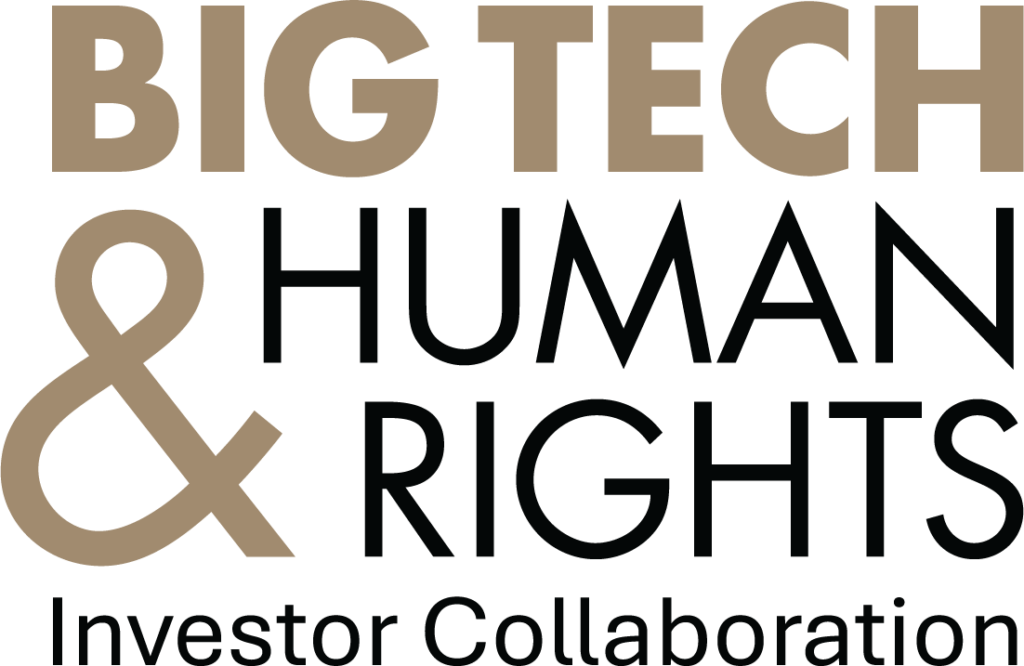Big tech companies’ products and services are increasingly prominent in our everyday lives and have a significant potential for societal impact. Digital services can contribute positively but also risk seriously harming human rights and social structures. A failure to manage these impacts can damage the companies’ social license to operate and the associated reputational, legal and regulatory risks may have material implications.
In March 2023, the Council on Ethics launched a collaborative engagement, supported by more than 30 investors with over EUR 7 trillion in combined assets under management, to collaboratively engage tech giants with the aim to strengthen their management of human rights risks and impacts.

The initiative builds on the investor expectations issued by the Council on Ethics and the Danish Institute of Human Rights in 2020. The primary goal is to ensure that Big Tech companies take concrete measures to address operational and human rights risks pertaining to their products and business models, and to encourage a more transparent reporting on the related impacts and efforts.
Engagement with Big Tech companies
The engagement aims to mitigate and alleviate the risks of negative impacts on human rights and encourage business models that align with the UN Guiding Principles for Business and Human Rights (UNGPs), with a focus on the human rights risks and impacts associated with the tech giants’ products and services.
The initiative targets seven companies which have been selected for engagement due to the significance of their platforms and the ensuing risks of human rights impacts:
- Alibaba
- Alphabet
- Amazon
- Apple
- Meta
- Microsoft
- Tencent
The initial phase of the collaboration consisted of defining the engagement objectives. The engagement objectives are aligned with the UNGPs. There are 12 objectives across five key areas: culture and business model, content, vulnerable groups, access to remedy and stakeholder engagement.
Click here for more details on the engagement objectives
| Area | # | Focus of the engagement objective | Description/goal |
| Culture and business model | 1 | Business model and drivers | The company's business model and strategy incorporate societal/human rights risk assessment and mitigation. |
| 2 | Corporate culture | The company's internal structures and culture enforce and support human rights risk management. | |
| 3 | Accountability and grievance mechanisms | The company's employee practices support its operational human rights risk and impact management. | |
| Content | 4 | Disinformation etc. | The company has robust content moderation measures in place. |
| 5 | Societal impact | The company makes efforts to address the broader societal impact of harmful content. | |
| 6 | Violence and extremism | The company prevents and reports on the use of its platforms/channels for violent and extremist content. | |
| Vulnerable groups | 7 | At-risk groups | The company takes dedicated measures to mitigate harm to vulnerable groups. |
| 8 | Children | The company has robust proactive and reactive systems for preventing negative impacts on children. | |
| Access to remedy | 9 | Grievance mechanisms | The company offers and participates in well-functioning grievance mechanisms. |
| 10 | Access to remedy | The company provides access to remedy for those negatively affected by its business. | |
| Stakeholder engagement | 11 | Public policy engagement | The company's public policy engagement aligns with the mitigation of human rights and societal harm. |
| 12 | Stakeholder engagement | The company constructively engages with relevant parties to support its human rights risk and impact management. |
Progress
Activities and progress in the investor collaboration are reported on annually:
Participating investors
The collaboration has grown since its launch in 2023, to more than 35 participating investors from eight different countries. The Council on Ethics co-ordinates the initiative, supported by a Steering Committee consisting of eight investors. Participating investors are organised in clusters focusing on each of the seven target companies, with at least one lead investor per company.
Click here to see the list of participating investors
Amundi
Första AP-fonden (AP1)
Andra AP-fonden (AP2)
Tredje AP-fonden (AP3)
Fjärde AP-fonden (AP4)
Sjunde AP-fonden (AP7)
APG
Aviva Investors
Boston Common Asset Management
Candriam
Cardano Asset Management
CCLA
Church Commissioners for England
Church of England Pensions Board
Christian Brothers Investment Services
DNB Asset Management
Domini Impact Investments, LLC
Ethos Foundation
Ethos Engagement Pool International (104 investors)
Ethos engagement services clients
First Sentier Investors
Handelsbanken Asset Management
KLP
Lannebo
LGPS Central
NY City Comptroller's Office
PGGM
Railpen
Robeco
Royal London Asset Management
Schroders
Skandia
Storebrand
Swedbank Robur
Swiss Association for Responsible Investments (11 investors)
Sycomore Asset Management
Universities Superannuation Scheme
Van Lanschot Kempen
Scope of the collaboration
All members of the initiative are independent fiduciaries and vote in accordance with their own voting principles, policies or guidelines and independent internal investment analysis. The Initiative does not require or seek collective decision-making or action with respect to acquiring, holding, disposing of securities nor making resolutions to AGMs. All members are responsible and accountable for their own independent voting decisions, including any pre-declaration or vote solicitation. Any decision by participants with respect to investing, divesting or in any way changing the level of holding of a security will always be at their sole discretion and made in their capacities as individual institutions.
